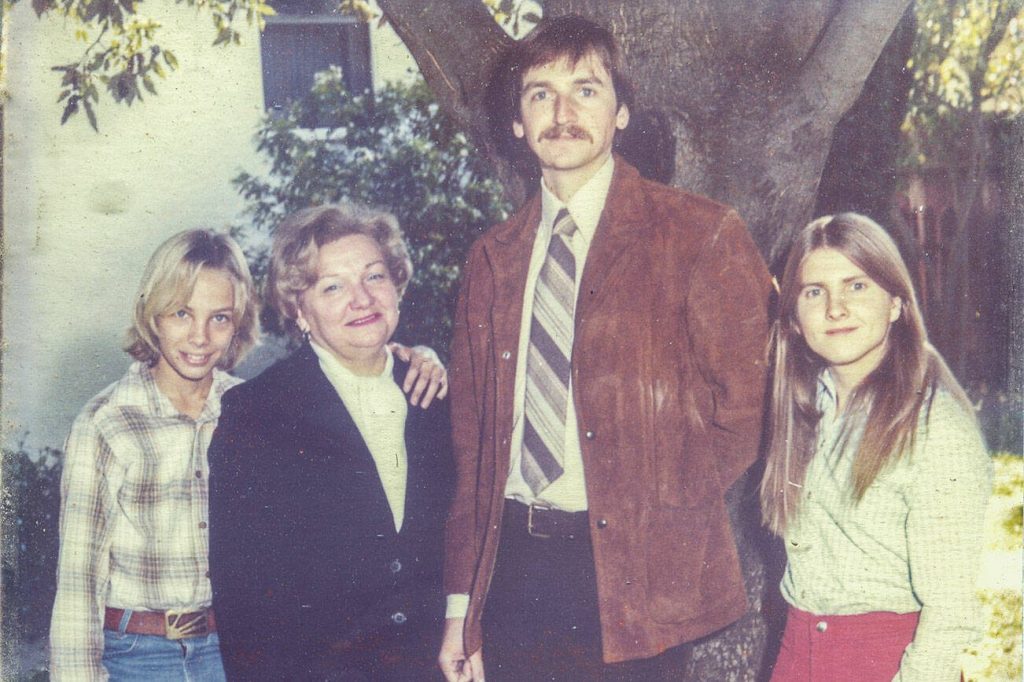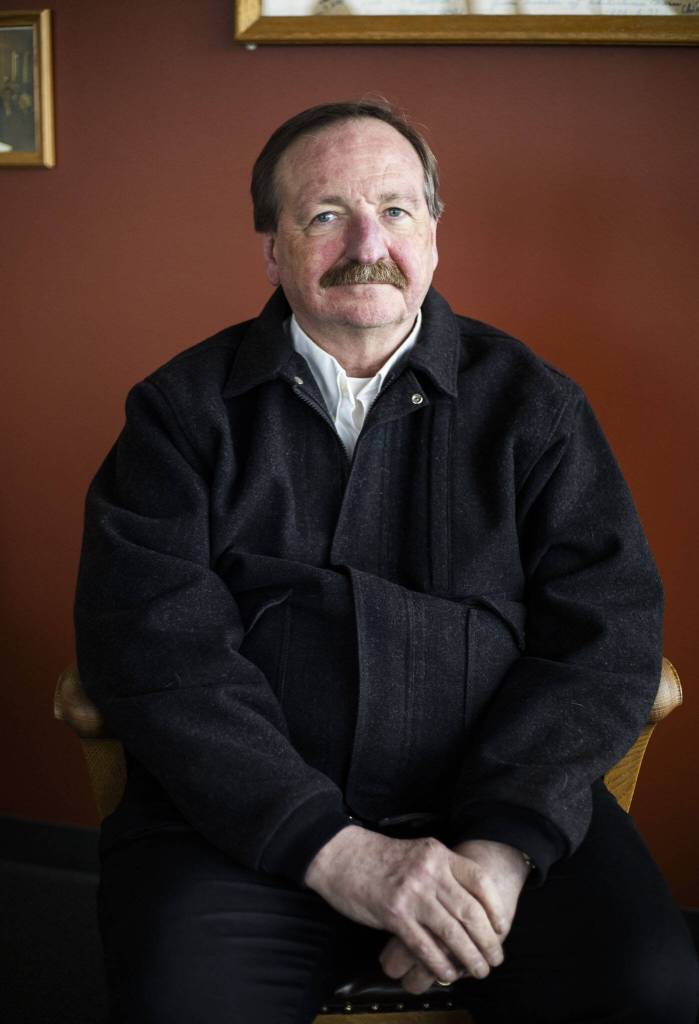On front lines of fentanyl crisis, Somers mourns brother’s overdose
Published 1:30 am Saturday, May 13, 2023





EVERETT — Back when County Executive Dave Somers played the tuba for the University of Washington marching band, he smuggled his younger brother into a Stanford football game.
“He was still kind of a small kid, and to get him into the game, we put a bass drum on him,” Somers said, smiling. “He walked right in.”
They grew up together in Napa, California. With a 12-year age gap, Somers had gone off to study fisheries while his kid brother stayed home. Nonetheless, he wrangled his kid brother, Alan Paulsen, into some college mischief that day.
Two months ago, Paulsen called to wish his big brother a happy birthday. The younger brother was living in a nice California-style apartment in Seattle, working as a contractor.
“A week later, he was dead,” Somers said in an interview with The Daily Herald.
After about a decade of sobriety, Paulsen suffered a fentanyl-related overdose on March 15. He was 58.
“It was hard to get that call. At first you don’t know what it is,” Somers said, pausing. “I didn’t think he had relapsed at all. It didn’t seem to me that he had. But addiction is a terrible thing.”
Fentanyl, a synthetic opioid 50 to 100 times stronger than morphine, has become a leading cause of fatal opioid overdoses in Snohomish County, killing at least 61 people in the county so far this year. Often taken in pill form or laced in other drugs, fentanyl-related overdoses are killing an average of two people per day in neighboring King County.
One month after Paulsen’s death, Somers gave a speech at the annual state of the county address with the Economic Alliance of Snohomish County, and he took time to discuss how fentanyl and opioid are ripping families apart.
“Last year in Snohomish County, 276 people died of an overdose, according to preliminary data, and of those, at least 207 were opioid-related,” Somers said to the crowd. “This is an increase of almost 20% from 2020. The numbers should give us all pause.”
Originally, fentanyl was introduced as post-surgery painkiller in the 1960s. Today it’s a cheap, dangerous high, selling for about $3 to $5 per pill in the streets and killing an average of 1,500 Americans per week. Local dealers often don’t know how much fentanyl is pressed into each pill. An overdose causes a person to slow or stop breathing, cutting off oxygen to the brain.
According to the King County Medical Examiner’s Office, there was no evidence of drug use in Paulsen’s apartment, but he tested positive for a lethal concoction of fentanyl, cocaine and methadone.
“It’s everywhere. It’s cheap and it’s readily available on the streets,” said Rita Jo Case, the regional director of housing services at Catholic Community Services. “Even when people have moved into housing … the grasp of this addiction goes deep.”
‘I lost track of him’
Around the time Paulsen was born, his mother’s struggles with alcoholism worsened.
“Our mom would, pretty much every weekend, go off and binge and make life miserable for everybody else,” Somers said. “Alan was born into that environment. It wasn’t fun.”
When Somers left for college, Paulsen was still a kid at home.
“Alan was productive. He was a good kid. He was smart — really smart. He was great at math, good with his hands, had his own business,” Somers said. “But Alan got born into the middle of it. I’m not a doctor or psychologist, but it was quite clear that he had trauma, mental trauma, for many, many years as a very young kid. And it affected him throughout his life.”
Somewhere between playing tuba in the Rose Bowl and hiding his kid brother in the band, Somers met his wife Elaine, who also played in the marching band. After earning a master’s degree, Somers and his wife moved to Snohomish County Paulsen moved in with them.
“I was really excited about it because I wanted to give him some sort of a real stable place and environment,” Somers said.
Together, the trio and all their animals — up to nine dogs at one point — lived in a rural part of the Monroe area for two years. But their mom needed help and maybe, Somers speculated, the pace of life in Monroe was too slow for Paulsen.
“Back in California, he got into trouble,” Somers said. “He was on and off taking care of my mom who never did recover from alcoholism. She was in and out of homes because she’d go for a while, and they’d kick her out because her behavior was so bad.”
“I don’t know a lot of the details, but he ended up HIV-positive,” Somers continued. “I lost track of him for a while.”
For years, Somers couldn’t find his brother. It “all fell apart” he said.
Then around 2010, Somers found Paulsen living in a tent city in Seattle. Somers showed up, and from there, his brother worked to get clean.
It wasn’t an overnight process, Somers said. Paulsen kicked heroin with methadone, a prescription drug used to overcome opioid addiction. He entered a housing program and got a subsidized apartment. He found religion and community.
“Alan cleaned himself up — he even weaned himself off of methadone,” Somers said. “I’ve been at many events to remember people who’ve been lost through overdoses. And I’d talk about him. I was so proud of him because it takes a very strong person to beat all that.”
In 2016, the longtime fisheries biologist and forester was elected Snohomish County executive. Understanding the grip of addiction, Somers convened the Snohomish County Opioid Response Multiagency Coordination, or MAC Group, a year later. The group brought the Snohomish County Sheriff’s Office, health district and human services providers together to grapple with the drug epidemic at a county level.
According to the executive’s office, the group reduced the Snohomish County Medical Examiner’s Office wait time for toxicology results in fatal overdoses from an average of 15 weeks to 12 days, trained hundreds of people in how to administer Narcan and secured millions of dollars in funding for future projects.
Despite the success of MAC and other programs, fentanyl’s claws have sunken deeper into vulnerable demographics, especially people living without shelter or with mental illness.
“I think once you have it, even if you’re beating it, it’s always tugging at you. It’s always a pressure,” Somers said. “… It’s like, you know how hard it is to lose weight. Imagine if you’re dependent on a chemical that even has a tighter grip on your mind and your body, and when you’re like Alan and so many others, when there’s trauma in your past, when there’s pain inside, self-medication has a powerful draw.”
‘If you don’t like seeing people on the streets’
Struggles with addiction in his family have colored Somers’ approach to the crisis as county executive.
For one, Somers aligns with a “Housing First” philosophy when it comes to helping people get clean. He said rules are essential, but he knows it can be extremely difficult to stop self-medicating on the streets in an unstable environment.
“There’s a segment of our population that says, ‘These people should just be locked up. … Drugs are illegal,’” Somers said. “But to actually heal somebody, to help them to heal and give them the assistance they need — that’s what we’re trying to do.”
In January, the opening of a Lynnwood methadone clinic stoked protests from parents who objected to its location. In April, Snohomish County hit the brakes on a potential 40-bed shelter plan at Hope Church in Everett amid outcry from neighbors in the Glacier View neighborhood. Somers said there’s “no perfect place” for treatment centers or shelters, but preventing them from opening does not negate the problem.
“If you don’t like seeing people on the streets, get them into a facility,” Somers said. “I understand citizens’ concerns. They’re real, they’re valid and they need to be addressed. … But we’ve not had real problems around any of our shelters or facilities. It’s really the folks on the street that are more problematic.”
Part of the problem, Somers believes, is that the federal and state governments “walked away” from mental health institutions and facilities amid the rise of modern pharmaceuticals.
Kent Patton, a spokesperson in the executive’s office, elaborated.
“The theory,” Patton said, “was you didn’t need big institutions because they had all these magic drugs now that would help with schizophrenia, depression and other mental health issues. They didn’t realize that just because you have (pharmaceuticals) doesn’t mean that people still don’t need a place to get intensive care.”
The lack of state and federal leadership left cities and counties to tackle mental health issues themselves, Somers said, creating a disjointed effort. Where King County has historically invested in housing, Snohomish County hasn’t done as much in that regard, Somers said. However, recent efforts to purchase and convert hotels into low-barrier homeless shelters are helping to fill that gap.
The hotels were purchased with American Rescue Plan Act dollars. Other funding sources are contributing to the fight against opioids, too. Last year, the state settled a $518 million deal with three of national largest opioid distributors, and Snohomish County is getting a $25.4 million cut. In 2021, the county also approved a 0.01% sales tax, made possible by House Bill 1590, that will fund affordable housing and mental health care.
Varied approaches across the state have exacerbated a complicated system, Somers continued. He understands firsthand how frustrating it is. When Paulsen died, he had to navigate the system across county and city lines.
Paulsen had been living with a roommate who also struggled with opioid addiction, Somers said. Paulsen’s death seems to have derailed his roommate’s sobriety. Now Somers is trying to help him, too.
“It’s very confusing,” Somers said. “There are a lot of programs, but there’s nobody to explain it. I’ve had a hard time navigating and figuring out what’s available and how to get (the roommate) help — and I work in government all the time.”
In the meantime, he’s preparing for his brother’s funeral.
An environmentalist to his core, Somers and his family opted to compost Paulsen’s remains and spread the nutrient-rich soil at their Monroe farm in a small ceremony in June.
“I am and was very proud of him,” Somers said. “He could have been gone a long, long time ago.”
Kayla J. Dunn: 425-339-3449; kayla.dunn@heraldnet.com; Twitter: @KaylaJ_Dunn.









